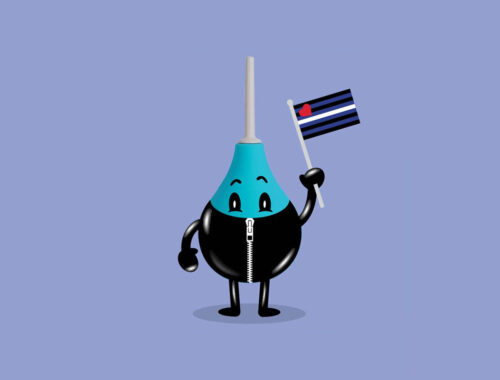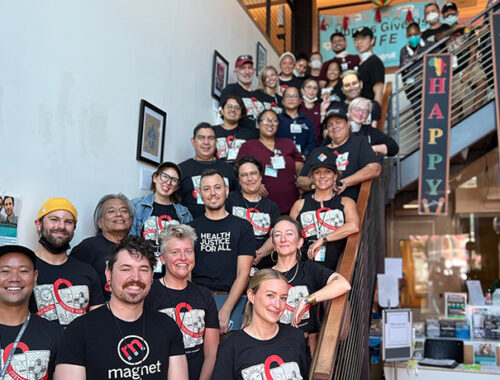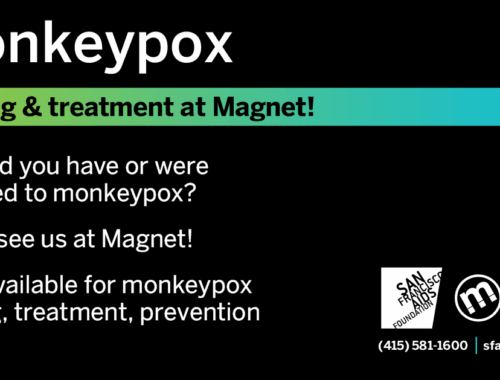We want to make sure you have the info you need about mpox, an infection that is circulating in our community.
New mpox cases
There has been a rise in the number of cases of mpox in San Francisco in the last month (late July through August 2023), with a total of 7 mpox cases reported among San Francisco residents. This is an increase from what we saw from January to June 2023, when there was an average of 1 case per month.
We recommend that people who may be at risk of mpox receive both doses of the JYNNEOS vaccine. It is important to receive both doses in the two-dose series in order to be best protected against mpox. The second dose can be given at least 28 days after the first dose. There is more information about how to receive the first and second doses of the vaccine below.
If you have not been vaccinated (received no doses) or have never had mpox infection and you have been notified about an exposure, you should receive the vaccine as quickly as possible to reduce the chance of developing an infection.
Symptoms
Symptoms often start with flu-like symptoms, including fever, headache, and fatigue, but not everyone has these symptoms. 1 to 3 days later, people may get a rash or “blisters” on the face, arms, legs, hands, feet, and genital and anal areas – the genital/anal rash appear to be very common during this outbreak. It usually takes around 5 to 14 days after any exposure for symptoms to appear (the “incubation period”). Find more answers to Frequently Asked Questions.
Diagnosis & Treatment
Magnet is available for diagnosis and treatment for people that develop rashes around their genitals and/or anal area, and/or on face, hands/feet, and other parts of the body that may be caused by mpox or another infection. Stop in for a standard sexual health screen visit at Magnet for diagnosis and treatment.
Testing
Testing for mpox involves taking a swab of the rash to see if it might be caused by mpox or a different infection. Only those experiencing rash or blister-like symptoms may receive testing at this time, which involves taking a swab of the rash. Stop in for a standard sexual health screen visit at Magnet for testing.
Vaccination
The JYNNEOS vaccine is safe and effective at reducing the risk of mpox, with two doses providing the best protection, regardless of how the vaccine is administered.
Find vaccination sites here.
SFAF is providing the JYNNEOS vaccine. The JYNNEOS vaccine is a two-dose vaccine and we recommend that you receive both doses at least 28 days apart for maximal protection. Please call us at 415-581-1600 or drop in for a standard sexual health visit at Magnet if you’d like to receive the vaccine.
Mpox vaccinations are recommended for:
- Cis gay, bisexual, and other men who have sex with men
- All transgender and nonbinary individuals (who have sex with cis men or trans folks assigned male at birth)
- People in the sex trade of any sexual orientation or gender identity
- People who have had close contact in the last 6 months with someone with suspected or confirmed mpox
- People who had close contact with others at a venue or event in a social group in the past 6 months where a suspected or confirmed mpox case was identified
- People who anticipate experiencing any of the above
- People who are living with HIV
- People who are taking or are eligible to take PrEP
- Lab workers who routinely perform mpox virus testing
- Clinicians who are likely to collect lab samples from people with mpox
- Clinicians who have had a high-risk occupational exposure (e.g., examined mpox lesions or collected mpox specimens without using recommend personal protective equipment)
At this time, no “booster” vaccine is recommended if you have already received both doses of the JYNNEOS vaccine. If you have been previously diagnosed with mpox, it is not recommended that you receive an mpox vaccine at this time.
Second doses of vaccine
We are providing the second dose of the JYNNEOS vaccine to people who are beyond 28 days from receiving their first dose.
Intradermal dosing
We are offering both subcutaneous or intradermal vaccinations. The intradermal administration works as well as the subcutaneous administration despite the lower dose. People under age 18 and people with a history of keloid scarring will continue to receive a subcutaneous dose. For more information, see our FAQs about intradermal dosing.
Reduce your risk
Know how mpox is transmitted, and take steps to reduce your risk. You can get good tips on how to reduce your risk–while still enjoying this summer’s festivals and summer parties–in this guide.
Read tips
Last updated on May 18, 2023. SFAF will continue to update this page as additional information becomes available.









